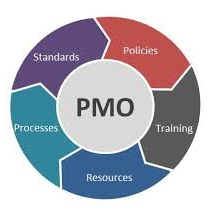Project Management is the vehicle to ensure successful development of products and services. The Project Management Office (PMO) is a vital asset to an organization that strives to govern and standardize project management practices to deliver business value. Companies benefit from having a Project Management Office (PMO) that creates an alignment of projects to its strategic objectives to deliver successful products and services. Let’s go deeper…
WHAT IS THE PMO?
The PMO is a structured group that provides governance, oversight, training, defines standards, develop processes and apply best practices to its organization for the achievement of effective and successful project delivery. It is responsible for organized, centralized and coordinated management of projects. The PMO also maintains the project portfolio by selecting and prioritizing projects based on the company’s objectives and strategy. Resources are planned within the organization to achieve optimal use of skills and time. The PMO provides ongoing communication that will inform, train and coach stakeholders and project/program managers.
WHAT ARE THE BENEFITS?
When the PMO is equipped with good people, processes and supporting technology, the PMO can deliver tangible and meaningful benefits such as:
- Standardized processes for consistency, efficiency and support
- A strategically aligned project portfolio
- Improved communications within project teams, across projects and the entire organization
- Identified and track dependencies between projects and programs.
- Application of best practices
- Improved and increased skillsets of project managers- Project Managers are trained. Review our training courses at PM Council.
WHAT ARE THE FUNCTIONS OF THE PMO?
- Governance – To provide processes, training, oversight and make decisions to ensure alignment, consistency and effectiveness in delivering projects and programs that meet the objectives and strategy of the company.
- Transparency – To provide ongoing communication about the projects/programs and portfolio within the company.
- Reusability – To develop processes, standards and templates to provide consistency without having to reinvent the wheel.
- Support – Provides ongoing support of the project work that aligns to the company’s objectives and strategy. This support includes tools, templates, training, mentoring, etc.
- Traceability – Enables project results to be traced back to project requirements and project charters. It enables a single system of record for supporting and delivering projects.
THE ROLES IN THE PMO
- Director – Oversee the projects/programs across the entire organization. Establishes the standards, and manages resource distributions
- Management – Helps, advises, mentors, and trains project managers. Shares and manages project knowledge, conduct reviews, facilitates meetings and audits project work.
- Project Managers – Leads projects and programs with the organization while adhering to the processes and standards defined.
- Support Roles (Project schedulers, planners, controllers and admin staff) – Various support positions that assist project managers to carry out project work, assist management in project audits and assist with providing tools and templates for the project work.
TYPES OF PMOS
- Supportive – The Supportive PMO primarily provides standardized processes, best practices, templates, training, administrative services and expertise to support project teams across the entire organization. The level of control by Supportive PMO is low.
- Controlling – The Controlling PMO provides the support such as the standardized processes, best practices, templates, training etc. just like the Supportive PMO. The key difference in this type of PMO is that it requires the utilization and adoption of the support provided. Reviews and audits are established to ensure compliance. The level of control by the Controlling PMO is moderate.
- Directive – The Directive PMO owns the projects by providing the project managers and resources to manage the project. It ensures a high level of consistency of practices across all projects. It has full control over the projects.
A PMO can be an essential function of your organization. It produces strategic value in aligning projects to your company’s goals with effective delivery. There are a slew of portfolio management software like Planview that can provide your PMO with tools to help evolve and deliver business results.

